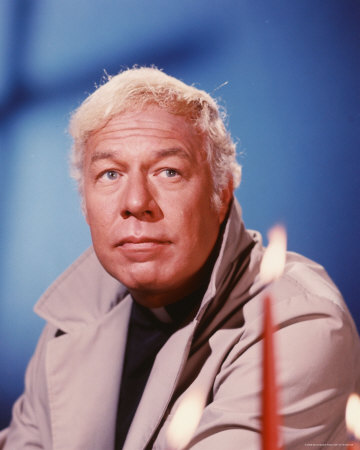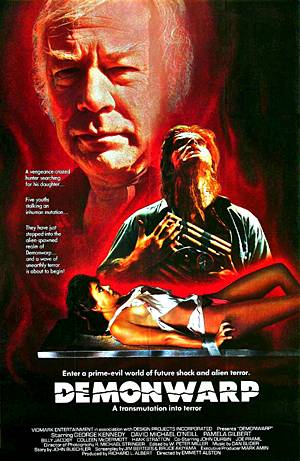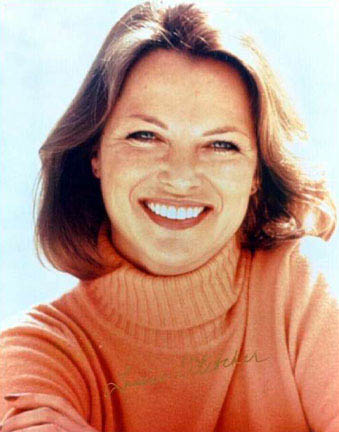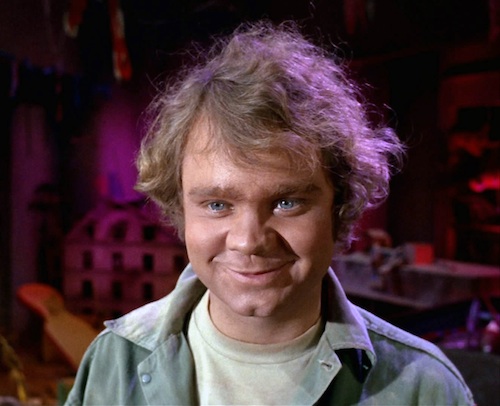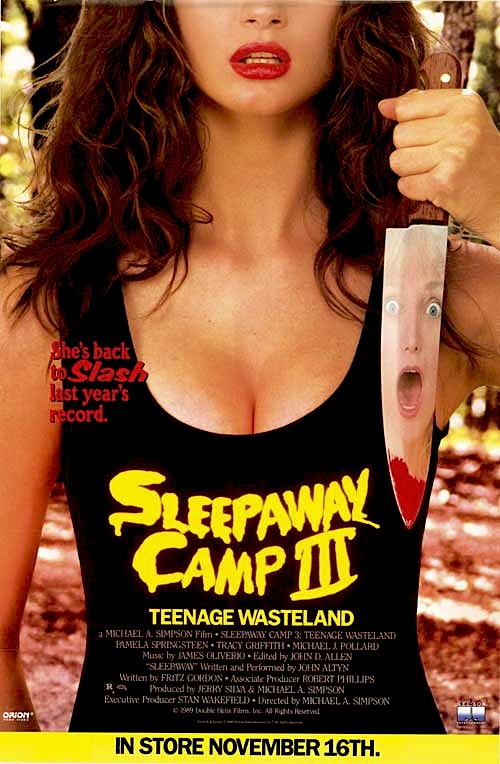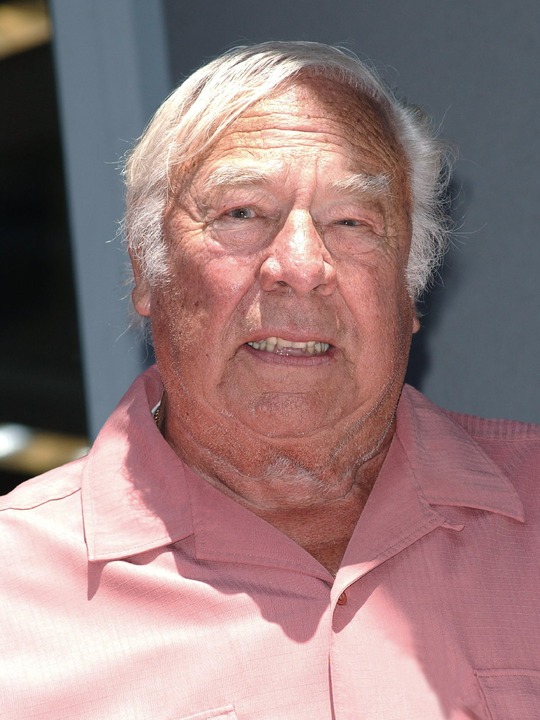From the Bottom to the Top to the Bottom: Part Three in a Series
 Monday, October 17, 2011 at 6:00AM
Monday, October 17, 2011 at 6:00AM 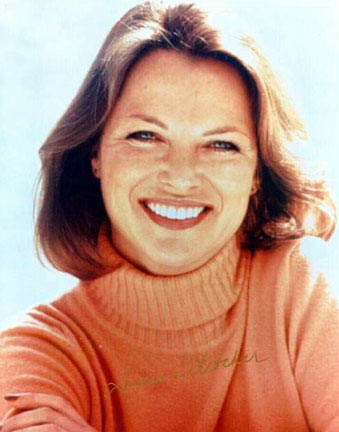 At the moment of her greatest triumph, Louise Fletcher delivered a funny, well-prepared speech that ended with a moving tribute to her deaf parents, which she delivered in sign language. You can watch it here, and if you’re anything like me there’s a good chance it will cause a mighty lump to rise in your throat.
At the moment of her greatest triumph, Louise Fletcher delivered a funny, well-prepared speech that ended with a moving tribute to her deaf parents, which she delivered in sign language. You can watch it here, and if you’re anything like me there’s a good chance it will cause a mighty lump to rise in your throat.
But not everyone was as moved by her speech as I was just now. As she headed backstage, Robert Altman—who she considered a friend and who helped resurrect her career a year earlier in Thieves Like Us—was spotted laughing as he cruelly mimicked her sign language gestures.
But Altman’s assholish behaviour wasn’t completely random—he was pissed off at her because he had based the role of a gospel singer with two deaf children who has an affair with a womanizing folk singer in Nashville on Fletcher and her experience as the daughter of deaf parents. Those of you who remember that film know that Lily Tomlin eventually received an Academy Award nomination for the part. The reason Fletcher didn’t play the role—and the reason why Altman felt compelled to act like such a prick that night she won her Oscar—was because she had been offered the role of Nurse Ratched in One Flew Over the Cuckoo’s Nest, which was scheduled to shoot at the same time. She picked the right one and Altman never forgave her for it—they never worked together again.
I mention this because it’s a classic example of how very few victories aren’t at least a little bit bittersweet. Even one as close to a fairy tale as Fletcher’s—which saw her spend five years toiling in early 60s television obscurity, before giving up on acting completely for 10 years, and then winning the Oscar 2 years after she returned to the profession. It’s a great story, but not necessarily one with a happily ever after ending.
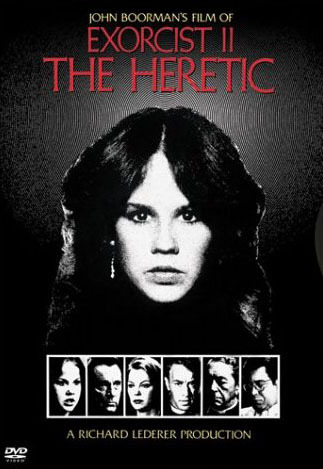 Following her win, Fletcher signed on to costar in the much-anticipated sequel to one of the most successful films of all time. For a 43 year-old actress who just a few years earlier had been completely out of the industry, this was an amazing development. But fate had something else in mind, because that film turned out to be The Exorcist II: The Heretic—a film so despised upon its release at least one poll at the time suggested it was the second worst film ever made, behind only Plan 9 From Outer Space. (It turns out everyone in the world except me is wrong about this. The Heretic is awesome; it’s the first movie that sucks).
Following her win, Fletcher signed on to costar in the much-anticipated sequel to one of the most successful films of all time. For a 43 year-old actress who just a few years earlier had been completely out of the industry, this was an amazing development. But fate had something else in mind, because that film turned out to be The Exorcist II: The Heretic—a film so despised upon its release at least one poll at the time suggested it was the second worst film ever made, behind only Plan 9 From Outer Space. (It turns out everyone in the world except me is wrong about this. The Heretic is awesome; it’s the first movie that sucks).
Lacking the glamour that might extend the career of another aging actress, Fletcher never got the chance given to most Oscar winners to star in at least one major Hollywood film. Instead she went on to a career on TV and in B-Movies—some good, a lot bad. B-Movies gave her the chance to play the title role in Mama Dracula, but it turned out that probably wasn’t a good thing.
But things wouldn’t get overly dire until 1987, when she suffered the one-two punch of Grizzly II: The Concert and the subject of today’s post, which takes the prize for the lowest moment of her career mostly because Grizzly II was never finished or officially released. Like One Flew Over the Cuckoo’s Nest, today’s subject was a literary adaptation, based on a 1979 book written by an author so popular that her heirs chose to hire a ghostwriter to continue writing books under her name after her death in 1986. It’s a gothic tale of familial secrets, cruelty, and incest, starring The Cute Girl with the Robot Brain and Steve Martin’s future ex-wife, and it’s really, really terrible.
I am, of course, talking about:
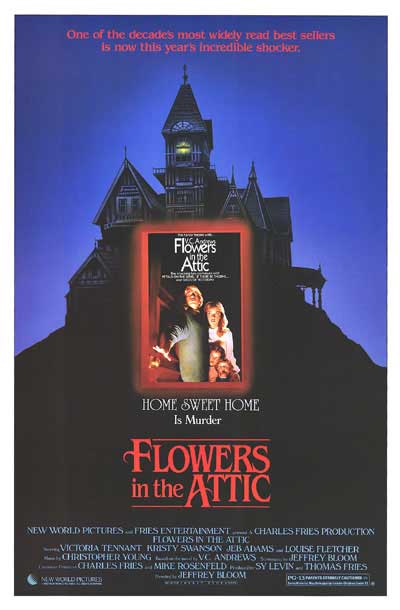
I’ve never read any entries in the “V.C. Andrews” canon, so I cannot honestly spend any time discussing her contribution to literature. Speaking dishonestly, I know she sucks because the only people I’ve ever seen read her books are…well…I can’t go there without seeming like a snobby asshole, can I?
Still, Flowers in the Attic is such a disaster as a movie it’s hard not to assume that its deepest flaws emanate directly from the source material. For those unfamiliar with either version, I’ll do you the favour of completely spoiling the experience so you need not suffer either.
Kristy Swanson plays Cathy, the eldest daughter of the four blond-haired Dollanganger children. She’s sad because her dad has died and left the family broke and homeless. Their only hope for survival is to move in with her wealthy grandparents, who so disapproved of her parents’ marriage they cut off all contact with them. Olivia (Fletcher) is still so pissed off by what Cathy’s mom (Victoria Tennent) did she insists that the Dollanganger children will not be allowed to roam freely in her home, but will instead spend all of their time silently locked away in their room.
It’s a terrible bargain, but Mrs. Dollanganger it seems has few options. When she does threaten to take the children away from the house, Olivia just laughs and tells her to go ahead. She then whips her to show her who’s boss. The kids' world expands a little when they find a door in their room that leads to the attic, where they entertain themselves with old clothes and toys. Without anyone else to pay attention to Cathy and her brother Chris become closer than siblings probably should be. Then they all start getting sick, and Cory, the youngest boy, dies.
Turns out the reason Olivia is so intent on hiding the kids is because her husband has no idea they exist. Their existence was kept from him because Cathy’s mom and dad were actually brother and sister.
To make matters even creepier, Cathy’s mom is trying to get into her parents’ good books by marrying a suitor who doesn’t share the exact same biological lineage, but he doesn’t know she has kids, which is why she’s been poisoning their food.
It all comes to a head when the three surviving Dollanganger kids escape, crash their mom’s wedding and confront her for her crimes against them. Cathy tries to force her mom to eat one of the poisoned cookies, which leads to a moment of such incompetent cinematic hilarity my words cannot do it justice:
Flowers in the Attic is so overwrought, laughable, and just plain wrong that it seems doomed from its very conception. Perhaps a more talented filmmaker than the man who gave us Blood Beach might have been able to do a better job, but that’s pure speculation. What we do have is a film that fails on every level, with one of the worst performances given by the sole Oscar winner in its cast. As Olivia, the sadistic grandmother, it’s hard not to see and hear Nurse Ratched in her every utterance and gesture. Only this time, she’s awful. It truly is a testament to the power the screenplay, director and editor have in shaping a performance. Is it possible that somewhere there is footage from Cuckoo’s Nest where she is just as horrible as she is here? Probably not, but it does prove that a lot more goes into an Oscar-winning performance than the work of the one actor.
Following Flowers in the Attic, Fletcher’s career has consisted of bit roles in movies and guest turns on TV. All in all, hers has been a decent career, but not one anyone seems interested in invigorating or giving a great final act.
Speaking of final acts, next week we take a look at a fine actress whose last years were spent making some pretty terrible movies.
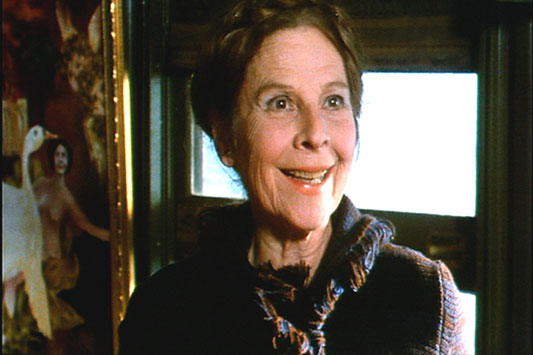 Ruth Gordon
Ruth Gordon
 B-MOVIE BULLSH*T,
B-MOVIE BULLSH*T,  FtBttTttB,
FtBttTttB,  Louise Fletcher in
Louise Fletcher in  B-Movies,
B-Movies,  FttBttTttB,
FttBttTttB,  Horror
Horror 
